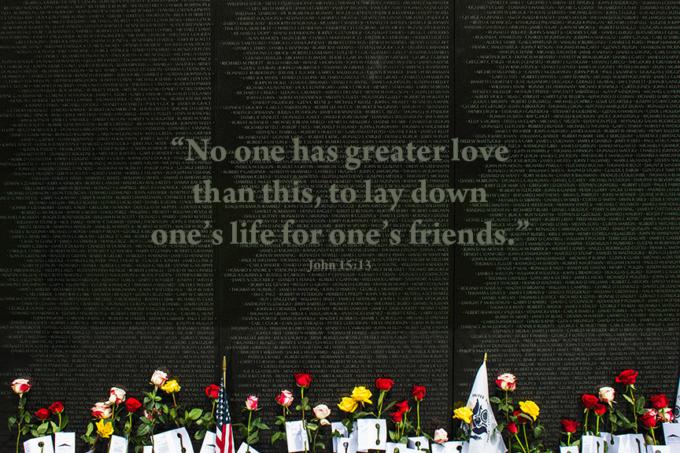
Culture
This Memorial Day weekend, as you light up the grill, celebrate with friends, and enjoy a long weekend, take a moment to reflect on the example of Christ and those women and men honored on Memorial Day.

Reardon
''This is my body, which will be given for you; do this in memory of me." (Lk 22:19)
Memorial Day weekend is an important day to reflect on the meaning of sacrifice. Although this holiday has come to be seen as the unofficial start of summer and an opportunity for a long weekend, it should be a moment of reflection and gratitude. It is a moment to remember the women and men who gave of themselves for a cause greater than themselves and a reminder of the sacrifice of Christ.
Reflecting on the Stations of the Cross is to reflect on two seemingly contradictory ideas: suffering and love. Imagining the scene at each station, the physical and emotional pain is palpable. This is amplified when we remember Jesus praying to God in the Garden of Gethsemane, "Father, if you are willing, take this cup away from me." (LK 22:42) He did not want to suffer, yet he did. In agony, he cries out on the cross: "My God, my God, why have you forsaken me?" (Matt. 27:46; Mark 15:34).
Thanks to my high school Scripture class, I am armed with the knowledge that Christ's suffering and anguished cry is a reflection back to Psalm 22. Jesus is suffering, and powerful feelings of emotional and physical pain are enveloping his body. Reflecting on his suffering is difficult because it is real and we can imagine being in that place, but we also realize the suffering he endured is truly unimaginable. If the story ended here, this would be a depressing moment and all hope would be lost. Yet, this is not the whole story. Just like in Psalm 22, the story continues. It is through this act of suffering that we come to be saved. Jesus puts others first.
Christ's radical command was "love one another as I love you." (Jn 15:12) It is radical in that Jesus is telling us to love as he loved. Love where we put others ahead of ourselves, accept people as they are and see all as God sees us -- made in his image and likeness. Most people stop at this line, but the next line of this passage tells us that "No one has greater love than this, to lay down one's life for one's friends." (Jn 15:13) This is what Jesus did for us. This was his ultimate sacrifice and demonstration of love.
At Catholic schools, students are taught that they are made, known, and loved by God, and with that comes responsibility to use those gifts in service to others. These are not just slogans or words in Catholic schools, but expectations reinforced and modeled by faculty and staff who challenge students to live up to their God-given potential and develop a sense of responsibility to others. I do not think it is a coincidence that the current and three previous chairmen of the Joint Chiefs of Staff all went to Catholic elementary school, Catholic high school, or both. In fact, two of them, General Mark Milley and General Joe Dunford, both were educated at Catholic schools in the Archdiocese of Boston. Catholic schools matter.
This Memorial Day weekend, as you light up the grill, celebrate with friends, and enjoy a long weekend, take a moment to reflect on the example of Christ and those women and men honored on Memorial Day. Although most of us will never be called to make the ultimate sacrifice in service to others, we should all reflect on how we can live our lives in a way that reflects Christ's command to "love one another as I love you."
- Michael B. Reardon is executive director of the Catholic Schools Foundation, www.CSFBoston.org.
Recent articles in the Culture & Events section
-
What is truth?Michael Reardon
-
The 75th anniversary of St. Ignatius of Loyola Church, Chestnut HillThomas Lester
-
The most important prayer you already knowLaura Kelly Fanucci
-
Two years after DobbsRussell Shaw
-
Scripture Reflection for July 21, 2024, Sixteenth Sunday in Ordinary TimeDeacon Greg Kandra





